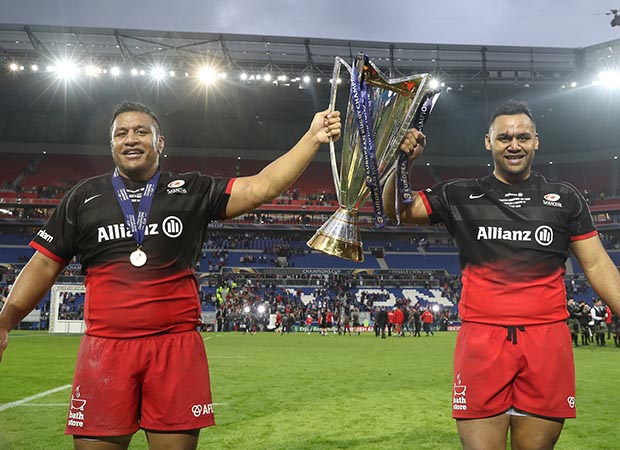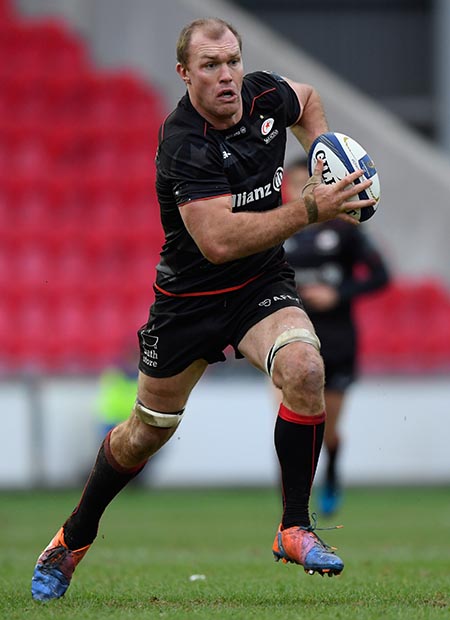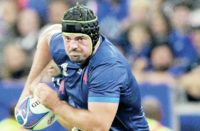 Schalk Burger has scaled most of the high peaks in the game, including reaching the summit as part of South Africa's 2007 World Cup-winning side. Before the craggy
Schalk Burger has scaled most of the high peaks in the game, including reaching the summit as part of South Africa's 2007 World Cup-winning side. Before the craggy
34-year-old Springbok icon joined Saracens this season he had played in four World Cups, been part of a winning series against the Lions in 2009, and won two Tri-Nations titles (2004 and 2009) in an 86-cap innings spanning the 13 seasons from 2003 to 2015.
However, three years ago, the archetypal big, aggressive, battling South African flanker faced his steepest climb of all, surviving an attack of bacterial meningitis, following an operation to remove a cyst, which left him at death's door.
When I met Burger as Saracens bid for another European Cup and Premiership double got underway in earnest this week, he told me he had mellowed and found a new outlook on life as a result of the experience.
“I was fighting…there was anger, rage and confusion. I was just battling. I got the feeling that if I was going to give up it was over. But I was newly married and had a three-month-old baby, so I had every reason to battle. When you get through something like that your perspective on life changes. Before, all you think about is rugby. But after that, rugby is a part of life, albeit important, but there are more important things.”
This is evident not just in the invaluable mentoring role that the quietly charismatic Burger offers to the young forward talent at Saracens, but also in his willingness to talk about some of the game's thornier issues more openly than those with narrower vested interests.
It is reflected in his call in our Page 2 story for South Africa to look North and become part of the Six Nations and the European Cup, and also to his regrets over the eye-gouging incident involving the 2009 Lions winger, Luke Fitzgerald.
Equally, having played against the All Blacks more than most international players would do in two careers, and beaten them in five Tests – including twice in New Zealand – Burger knows the pitfalls the 2017 Lions must avoid. Yet, he warns that his Saracens team-mates Owen Farrell, George Kruis, Maro Itoje, Jamie George, and Billy and Mako Vunipola will not be the lambs to the slaughter predicted by the bookies.
However, it's European Cup final business against Clermont in Edinburgh on Saturday that is uppermost on Burger's mind – and with it the chance to lay a bogey to rest. He reveals that despite a stellar international career he has not won any titles at provincial/club level.
“Next Saturday is the biggest game of the season. For me it's a landmark, and it's exciting. In 14 seasons I never won a Super Rugby final with the Stormers, or the Currie Cup with Western Province – Jean de Villiers and myself were both injured when WP won the title.”
His assessment of the team standing in the way? “Clermont look abrasive, direct, and they play with a tempo which suits them. The French play to their strengths, and once they get their big carriers playing at the tempo they want they are difficult to stop – so you cannot let them do that.
“The easiest game is when you turn up and control the pace and tempo from minute one to 80 – and early on you win the big moments. But I've played in enough big games to know it does not always go according to plan. The ability to adapt is paramount.”
However, Burger's enthusiasm for the European Cup is unbridled, and he says his first sample in Saracens superb victory in Toulon earlier this season started it.
“It's not often you are involved in a side that plays close to perfect rugby for 40 minutes. Those are the games you dream of, and that first 40 against Toulon was glorious. It was my first taste, and it will be hard to match!”
 He also holds the Premiership in high esteem: “In terms of intensity these two competitions are as good as anything I've played in. They are right up there in terms of quality and skill. The best Southern Hemisphere competition I ever played in was the old Super 12, when all the talent was condensed. It was a bit like a sprint played over three months. The Premiership is more like a marathon, and I like the mix of a block of European games where you have to be right on it.”
He also holds the Premiership in high esteem: “In terms of intensity these two competitions are as good as anything I've played in. They are right up there in terms of quality and skill. The best Southern Hemisphere competition I ever played in was the old Super 12, when all the talent was condensed. It was a bit like a sprint played over three months. The Premiership is more like a marathon, and I like the mix of a block of European games where you have to be right on it.”
Burger says: “Culture-wise Saracens and the Stormers are very similar. Brendan Venter instilled values that still hold true at Saracens – everyone is approachable, and there is
a lot of heart. The big advantage here is the lack of travel, so you can coach every week with full playing and coaching resources. In Super Rugby you are permanently on the road, and only travel with 25 or 26 players – and with Argentina and Japan having joined the travel side is even harder.”
He adds: “With the Stormers you have a massive turnover of players every year, and your culture changes. Whereas at Saracens they have kept the same group for about eight years, and are putting themselves in the way of trophies. At Saracens certain individuals enhance the culture, and it gets moulded around them – there is not the same constant changing of the guard that you get in South Africa.”
So, does he believe that the ‘Saracens Six' in the Lions squad will carry that mould with them and become Test starters? “The Sarries guys are all good enough players to make it, and top-quality blokes who are determined.”
Burger says that the 2017 Lions squad has steel. “This is a very good Lions squad, and this group will not be beaten before they get out there – there will be a lot of belief. New Zealand is a rugby nation that respects teams that fulfil the challenge of playing against the All Blacks. Often teams go there and a lot has been said, but they do not fulfil the challenge.”
He draws on his own experience to offer this advice: “I played in Springbok teams that beat New Zealand on a number of occasions, and won a couple of times over there, in Dunedin (2008) and Hamilton (2009). The second time was particularly sweet because we won the Tri-Nations. New Zealand are even more of an all-round team now, but whenever the Springboks put them under a lot of pressure we did well.”
Burger says: “It will be tough to beat New Zealand – history shows it. That's why the first Test is very important. The Lions have got a brutal schedule – and that will be where the team will be tested. Sometimes it's not just picking the best players, but the best team.
“How long it takes the Lions to settle will give us a clear indication of how the Test matches will go, because those New Zealand franchises will be up for it.”
He adds that the lack of preparation time can be offset: “The good thing when you have so much talent at your disposal is that, like Barbarians sides, if you get the right players in the right positions, they instinctively do the right thing. So, if you get the team culture right, the rugby ‘sense' can come together quickly.”
Burger says that a bonus for the Lions is that the All Blacks are a known quantity.
“You know the All Blacks are not going to change, because it's a style they've played for the last 15 years. That's the easy part. What a lot of people underestimate – because they see the beautiful tries, skills, and offloads – is how physical they are. New Zealand pride themselves on how good their set-piece and lineout is, and a kicking game of recent times that has bossed the rest of the world.”
He adds: “The Lions would be foolish to think they will play New Zealand at their own game (and win), but this team, like South Africa, will have inherent strengths, and you have to take the bull by the scruff of the neck and play rugby. You cannot be one-dimensional or overly conservative, and you have to put them under pressure.”
Burger sums up: “The biggest difference between South Africa and the All Blacks in the recent past is just how good they are at taking their opportunities.
“The Lions are going to create opportunities, and if they convert them they will put the All Blacks under pressure. But we know also that if the All Blacks create six opportunities they will put four of them away. It's never easy, and it won't be for the Lions – but Warren Gatland knows the culture well enough. I can't wait to watch it.”
As for his own experience of the Lions, Burger fronts-up over his dismissal for gouging Fitzgerald, but says he still feels the electricity around the 2009 series.
“The Lions in South Africa only comes round once every 12 years, so it's a once-in-a-career opportunity for us, whereas a Lions player might get two or three bites at the cherry.”
“Obviously, the start of the second Test was not the greatest Bok moment of my life. I was injured for the first Test, which we won comfortably, but in the second I got yellow carded 50 seconds into it for eye-gouging – and then later got suspended for eight weeks, so I didn't play a part in the third Test.
“The second Test was one of the biggest roller-coasters any of that Springbok team ever played in – and we got off to a bad start due to me. Then we got back in the match and it was going each way until the 82nd minute when Morne Steyn slotted a penalty to save my bacon.”
Burger takes stock: “Look, in one's career there are various times when you get it wrong – and there is one where I got it slightly wrong – but it's one of those things.
“You don't ever enter a game with bad intentions, but it's something that happens on the spot. There was probably a bit of frustration because I missed the first Test, and really wanted to play in it.”
He adds: “The second Test was phenomenal to watch – and it felt like that to play in. When you have a chance to close out the Test series like that, you don't want it to go to the third Test match. It was a true test of our mettle – just an epic game.”
Now in the sunset of a similarly epic career, Schalk Burger is hoping to close out his first season at Saracens in style – with victory over Clermont the first call.


























